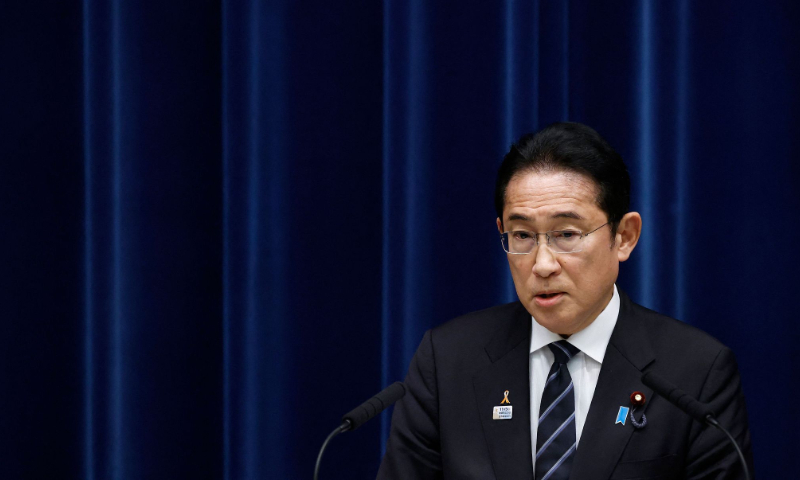
Japan's Prime Minister Fumio Kishida speaks during a news conference at the prime minister's official residence in Tokyo on November 2, 2023. Photo: VCG
Japan once again stands at a crossroads. As Prime Minister Fumio Kishida has stated, the world is at history's turning point. The issue is not the turning point itself, but rather the path Japan will choose in response.
On Thursday, US President Joe Biden held the first trilateral summit with the leaders of Japan and the Philippines. Prior to the summit, US media reported that the central topic of discussion was a "collective show of maritime force against China," and it turned out to be true.
Previously, on April 8, the defense ministers of the US, UK and Australia announced in a joint statement that they were considering cooperating with Japan on advanced capabilities projects under the Pillar II of the AUKUS security framework in which Tokyo has long shown an interest. Nikkei Asia reported that this framework is essentially aimed at countering China's rise.
As the geopolitical chess game in the Asia-Pacific region continues to evolve, Japan's recent strategic maneuvers, especially its possible alignment with the US within the AUKUS framework and the trilateral summit with the US and the Philippines, have drawn criticism.
Ironically, Japan's choices, ostensibly made to "strengthen regional security against the backdrop of China's rise," are likely to push Northeast Asia closer to a new cold war of division and military confrontation.
Japan, once a passive participant in the US' China strategy, now appears to be an active pawn in Washington's grand geopolitical game. This calls to mind former prime minister Yasuhiro Nakasone, who, with regret, described Japan as having no strategy. Nakasone's comment reflected his concerns about Japan's foreign policy, particularly its over-reliance on the Japan-US alliance and its lack of independence and strategic autonomy in international affairs.
Today, under Prime Minister Kishida's leadership, Japan is not only leveraging but actively expanding the impact of US strategy in the region, thereby risking the stability of the entire region.
Recent actions by Washington to form exclusive circles show a unified front or enhanced interoperability among allied forces. This year marks the second year of Japan's new national security strategy, which involves significant annual increases in defense spending to develop hypersonic missiles and purchase F-35 fighter jets from the US, thereby enhancing Japan's strike capabilities.
By these measures, Japan seeks to transform its past reliance on unilateral US protection into an alliance where Japan can also take offensive actions. This is a gamble as Japan will likely lose the trust of its neighbors.
Japan's possible involvement in AUKUS and its bolstered military capabilities are perceived by China as provocative rather than defensive measures. This enhancement in military strength, including the capacity for overseas power projection, may come at the expense of Japan's strategic autonomy and regional trust. According to Chinese scholars, while Japan has the right to assert its military stance, it must also be prepared to face the consequences.
Kishida seems to believe that strengthening military relations with the US, UK and Australia will enhance Japan's security and raise its international status, while also benefiting from closer cooperation with the US in high-end technology development and seeking US relaxation on Japanese arms exports.
However, by tying itself to the US chariot, Japan has compromised its ability to balance security alliances and regional stability.
Japan is effectively exacerbating divisions in Northeast and Southeast Asia, regions concerned about being caught in a geopolitical showdown and unwilling to take sides between China and the US.
Japan must tread carefully: Standing with allies is one thing, but only standing where one is told to stand is another. This not only increases the likelihood of conflict but also positions Japan as the first "shield" in future conflicts.














评论